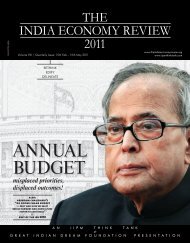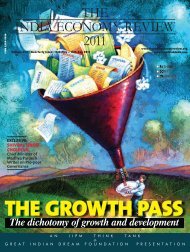Download - The India Economy Review
Download - The India Economy Review
Download - The India Economy Review
You also want an ePaper? Increase the reach of your titles
YUMPU automatically turns print PDFs into web optimized ePapers that Google loves.
P LANNING P ARADIGM<br />
Central Agency in<br />
With the changing role of the state in a globalised world, planning process in<br />
democratic country like <strong>India</strong> calls for ‘planning as persuasion’ where different voices<br />
get rightful place than being made into ‘abstract citizens’ to attain neutral planning<br />
Just like the function of painting<br />
dramatically changed after the<br />
invention of photography, the<br />
function of planning too drastically<br />
changed after the State has redefi ned<br />
its role in relation to market and civil society<br />
in a globalised world. <strong>The</strong>re is no<br />
suggestion to do away with planning (see<br />
Stiglitz 1997; Bagchi 2007). Rather, creative<br />
use of older paradigm of planning<br />
means not merely ‘seeing like a state’<br />
(Scott 1998), but also planning after ‘seeing<br />
like a household’, ‘seeing like a market’<br />
and ‘seeing like a collective’ all at the same<br />
time. Some authors (see Wade 1990) have<br />
argued that where there is a synergy of<br />
such different ‘sights’ through division of<br />
allocation decisions between market and<br />
the State, growth is more likely to occur.<br />
This paper aims to spell out the rationale<br />
for a new type of planning in democratic<br />
society like that of <strong>India</strong>, which could be<br />
termed as ‘planning as persuasion’.<br />
Neutral Planning<br />
for Political Masters<br />
Valuation is at the heart of policy making.<br />
Value-confl icts also refer to equity as the<br />
goal of public policy. Is there neutral planning<br />
when equity is the goal? It is good to<br />
be reminded of the history of Planning<br />
Commission to answer this. Ideological<br />
12 THE IIPM THINK TANK<br />
confl icts between Gandhians and Nehruvians<br />
in the pre-independence period (that<br />
time to go after industrialization or not) resulted<br />
in the formation of National Planning<br />
Committee in 1937 (Chatterjee, 2001:<br />
273), in the hope that such ‘neutral’ committee<br />
would be able to fi nd a workable<br />
path despite of ideological controversies.<br />
<strong>The</strong> committee reemerged as Planning<br />
Commission after independence.<br />
Vibrancy of democracy is the existence<br />
of different voices. Once these different<br />
voices are made into ‘abstract citizens’ a<br />
neutral planning is achievable. Fortunately,<br />
different voices in our country have<br />
not chosen to make the ‘exit’ option. That<br />
has made planning a challenging affair.<br />
Guha (2008) has argued that ideological<br />
divisions in the <strong>India</strong>n society determine<br />
the nature of scientifi c inquiry in this country.<br />
<strong>The</strong>re is no reason to believe that intellectual<br />
space exists apart from ideological<br />
orientations. As ideological divisions are<br />
deeply political, the ‘positioning’ in fact<br />
saturates any intellectual space. Valuations<br />
are entrenched in such ideological divisions.<br />
This has macro level applications at<br />
the decision making level for policy, also<br />
at micro level of policy implementation<br />
since policy performance is also dependent<br />
on the set of beliefs, values and judgments<br />
of participants.<br />
Reason-dominated planning has been<br />
the hallmark of modernity, and such rational<br />
determination in the planning process<br />
“…must know the physical resources<br />
whose allocation is to be planned, it must<br />
know the economic agents who act upon<br />
these resources, know their needs, capacities,<br />
and propensities, know what<br />
constitutes the signals according to which<br />
they act, know how they respond to those<br />
signals.” (Chatterjee 2001: 281). <strong>The</strong>re is<br />
always a lot of residue while technocratic<br />
planners gain such information. Such<br />
residue works as politics outside the political<br />
process upsetting the plans. A lot of<br />
what is attributed as ‘implementation<br />
defi cit’ is actually design failure. Free<br />
market propagators such as Friedman<br />
believed when planning is completely left<br />
to market such residue does not exist,<br />
since local people know what is best. Such<br />
thinkers, therefore, believed that hope for<br />
<strong>India</strong> is not from big industrialists or government<br />
planned public sector units,<br />
rather from street-level entrepreneurs<br />
who had perfect information about local<br />
realities. But, we may argue a planning<br />
that leaves space for such entrepreneurs is<br />
still desirable.<br />
<strong>The</strong>re are two options for planning<br />
here. One, ignore ideologies and pronounce<br />
like Clinton’s presidential cam-





